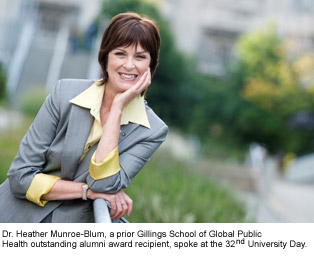Related Posts
var a2a_config = a2a_config || {};
a2a_config.linkurl = "http://mondaymorning.web.unc.edu/2010/10/21/doing-good-better%E2%80%94including-diversity/";
Doing good, better
We are proud that our School alumna, Heather Munroe-Blum, PhD, was selected to be the 32nd University Day lecturer. Munroe-Blum spoke about the development of University of North Carolina at Chapel Hill as an innovation in public education; it had never been done before the way it was here. She exhorted us to do good, better. “Today, we are being asked to examine how we can all do more to make our world a safer, more equitable, healthier and more prosperous place,” she said. “We are being challenged to do good, better.” Notice that public health is inherent in her statement. 
The challenge for us and many public universities is to do good, better in the face of continuing budget cuts and diminished staff resources. That requires us to define our core mission and separate what we must do from what is nice to do—part of the task of our SPH2020 planning initiative.
More diversity
Monday, October 18th was the first meeting for our Diversity and Inclusion Task Force (DITF). The rationale for the DITF is that if we want to make a transformational change in our diversity, we must understand the barriers and facilitators to enhanced diversity, make recommendations and act differently based on what we learn. Few universities are as diverse as they might be, should be. We are not either although we are similar in diversity to most of our peers. Some have more Asian students than we do. While race/ethnicity diversity is essential, so is diversity in political views, sectors, disability, sexual orientation, age, region, religion (that includes no religion) and other differences that help to define us. They make us human and interesting. Diversity and inclusion provide the basis for our excellence. Would you want to be in a School populated by yourself? Not me! I spend enough time with myself.
What I don’t talk about sometimes is defined by people as a problem. I don’t talk about religion. I believe in separation of church and state. Religion is personal. I don’t believe it is appropriate for me to share my religious views at the School, just as I avoid talking about my own political party choices. I occasionally hear that we (I) are not outspoken enough about the need for tolerance about the spectrum of religious thought—from not-religious to atheist and agnostic to the world’s known and little known religions. All religions have a home here. So do people who don’t define themselves in any way by religion or are anti-religion. Christians are welcome; so are Jews, Buddhists, Catholics, Muslims and Hindus. There are lots of other religions, and they are welcome here too. So are atheists and agnostics. It’s not my right to judge your religion or you by your religion (or lack of). Here’s the University’s policy on religious observances and the dates for this school year.
I look forward to the work of the Diversity and Inclusion Task Force and to their recommendations. It’s gratifying that over 60 people in the School volunteered for the effort. They have my appreciation. They’ll help make this school even better!
Happy Monday! Barbara
